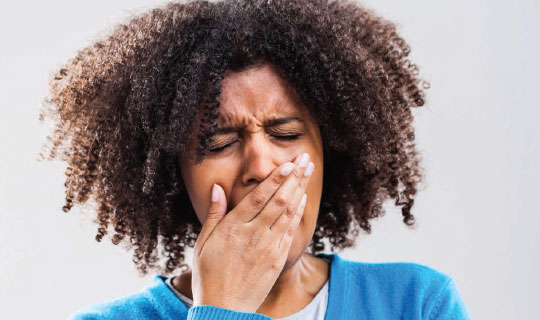Everybody feels tired sometimes. Here's how to know when your sleepiness isn't normal.
In a perfect world, you would sleep at least seven hours a night and feel vibrant and awake during the day. But only a third of people get the recommended amount of shut-eye, according to the U.S. Centers for Disease Control and Prevention. Some people spend enough hours in bed but have trouble going to sleep. Others don’t sleep soundly during the night because of a breathing problem such as sleep apnea.
Daytime sleepiness can interfere with your work, mood, energy and overall health. Too little sleep can increase the risk of serious health problems such as high blood pressure, diabetes, stroke and heart conditions. In short, sleep is important. If you think you might not be getting enough, when should you see a sleep specialist?
Signs for Concern
Although it’s normal to feel a dip in your energy before or after meals during the day, excessive sleepiness isn’t normal. “If sleepiness interferes with work or any other daytime activity, and if you’re an adult who gets less than seven hours of sleep a night despite having the ability to go to bed on time, it’s a good idea to get a sleep evaluation,” says pulmonologist Jyoti Matta, MD, Medical Director of the Center for Sleep Disorders at Jersey City Medical Center (JCMC).
In addition to excessive daytime sleepiness, signs of a potential sleep disorder include:
- Dozing off involuntarily
- Having trouble with your memory or concentration
- Having trouble falling asleep or staying asleep
- Snoring loudly
- Kicking your legs during sleep
- Suffering from depression.
Certain health conditions may also put you at higher risk of having a sleep disorder, Dr. Matta says. “If you’ve been diagnosed with high blood pressure, diabetes, a heart problem, or a lung disease such as chronic obstructive pulmonary disease (COPD), you should be evaluated for a sleep disorder, because those conditions are usually associated with a high incidence of sleep apnea,” she explains. Research has also shown that people who smoke don’t sleep as well as nonsmokers.
Identifying the Issue
At the Center for Sleep Disorders at JCMC, Dr. Matta and her team can diagnose and manage sleep conditions in anyone age 5 or older, including sleep apnea, insomnia, narcolepsy, sleepwalking and restless leg syndrome. In addition to evaluating underlying medical conditions, the center employs sophisticated diagnostic equipment to monitor brain, heart, respiratory and muscle activity during a patient’s sleep. Tests include:
- Polysomnography (PSG), in which a patient’s sleeping heart rate, brain waves, breathing and movements are monitored via sensors on the scalp, chest and other areas of the body. This test usually takes place overnight at the center, though patients who meet certain criteria may be able to do the study at home.
- PSG with Continuous Positive Airway Pressure (CPAP) is a variation of this test. CPAP involves a mask over the nose and mouth that increases the air pressure in the throat to regulate breathing. In what’s known as a split night study, a patient might be given a CPAP machine during the second half of the night.
- Multiple sleep latency test: Frequently done in conjunction with a PSG, this test monitors the ability to fully awaken from daytime naps for people who have excessive daytime sleepiness.
- Measurement of wakefulness test: This test measures a person’s ability to stay awake during conditions of limited sensory stimulation—for example, driving a truck or operating heavy machinery.
- Positive Airway Pressure (PAP) nap: This daytime nap study is designed for patients who have anxiety about starting PAP therapy or are having difficulty tolerating it. If a sleep disorder is identified, the center offers several treatments and can refer patients to other specialized doctors for additional treatment if needed—for example, a psychiatrist if the patient might benefit from cognitive behavioral therapy for insomnia.
Could You Have a Sleep Disorder?
If you answer “yes” to any of these questions, you may need to see a sleep specialist to check for a sleep disorder such as sleep apnea, restless leg syndrome, insomnia or narcolepsy.
1. Do you feel tired during the day to the point that fatigue affects your memory, ability to work or focus?
Yes or No
2. Do you fall asleep during meetings or while reading or watching TV, talking with others or driving?
Yes or No
3. Do you snore loudly or gasp for breath during sleep, or does a partner tell you it sounds as if your breathing stops during sleep?
Yes or No
4. Do you have aches, pains or a creeping feeling in your legs as you try to fall asleep that get better if you move?
Yes or No
5. Have you been diagnosed with high blood pressure, diabetes, obesity, a lung condition such as COPD, or had a heart attack or have other heart problems?
Yes or No
6. Do you smoke?
Yes or No
To schedule an appointment at the Center for Sleep Disorders at Jersey City Medical Center, call: 201-915-2020 or visit: The Center for Sleep Disorders at Jersey City Medical Center to learn more.
